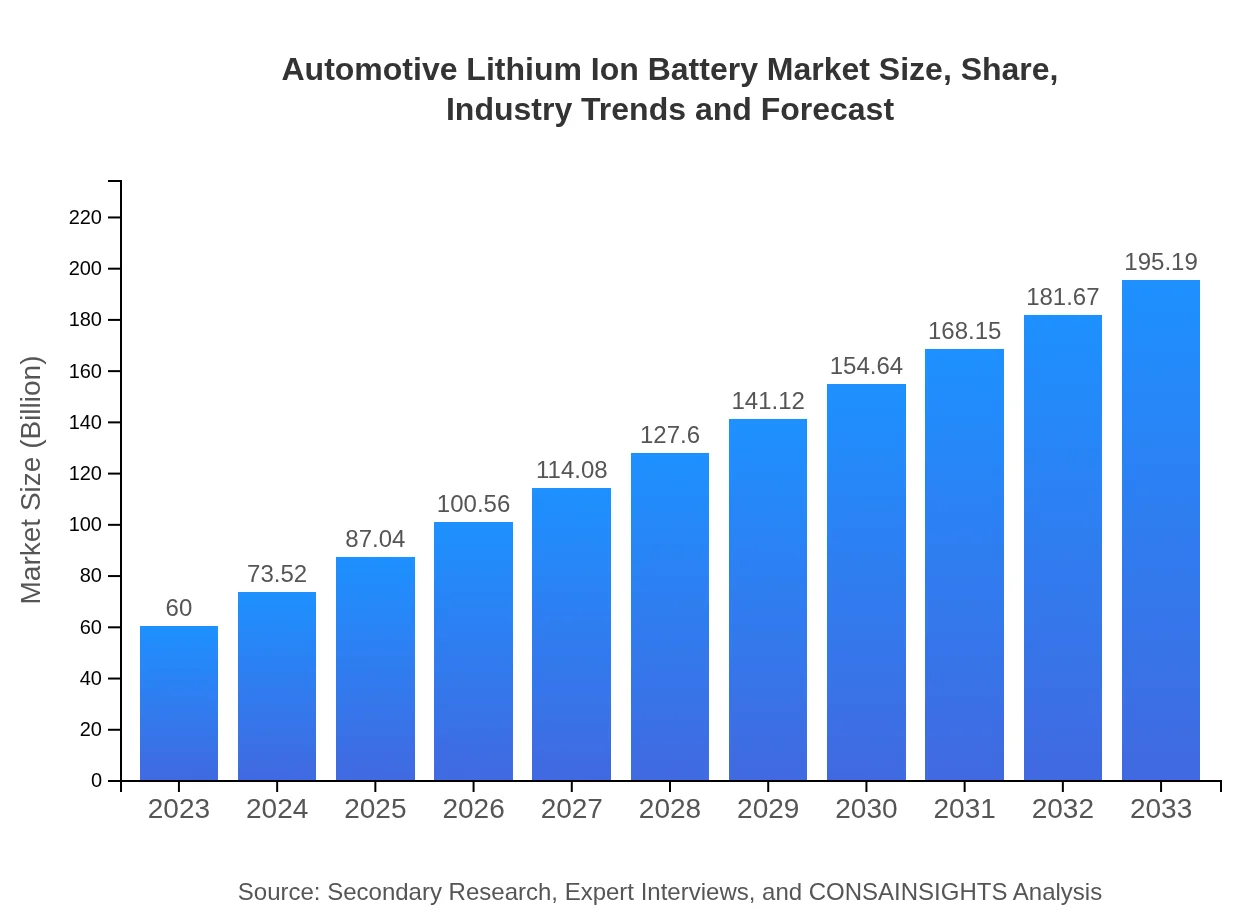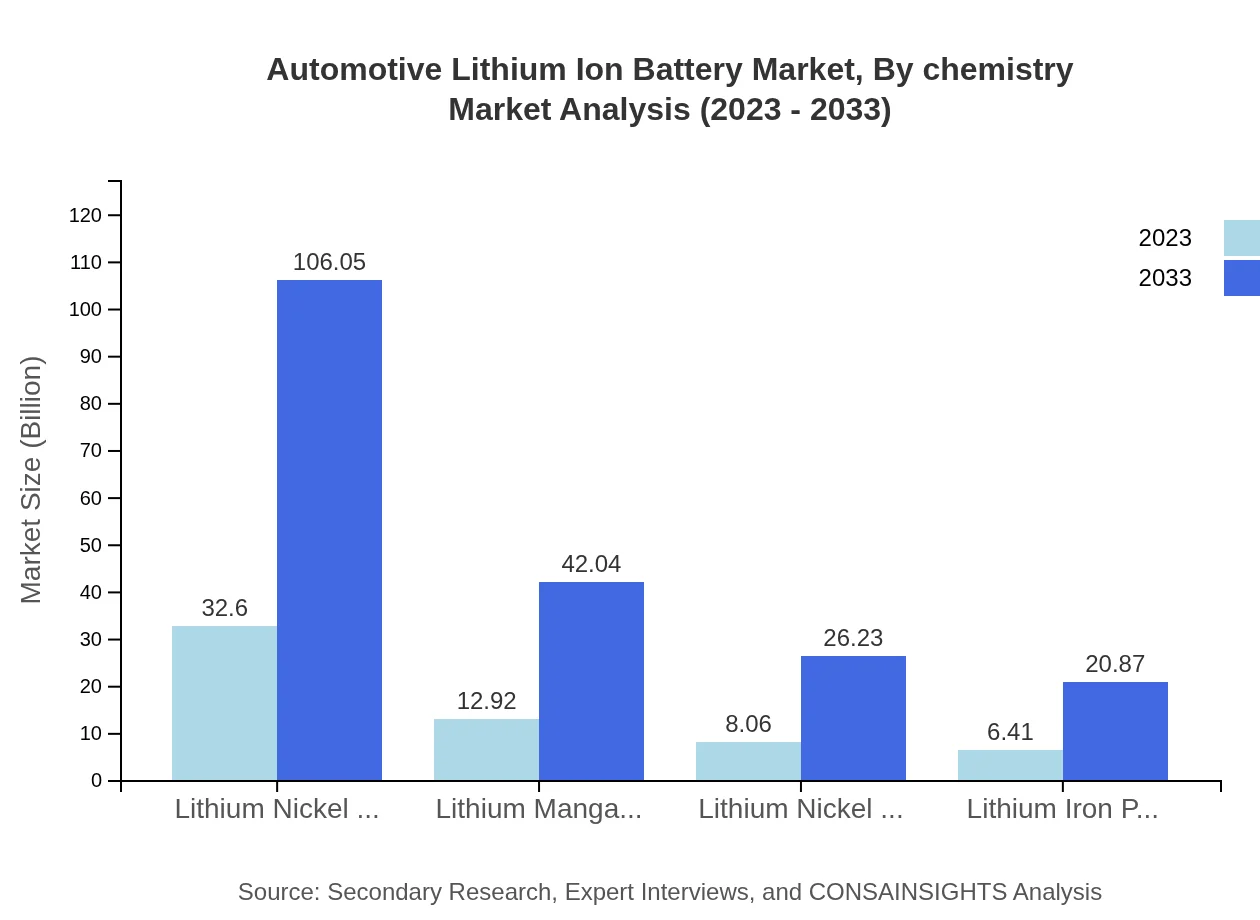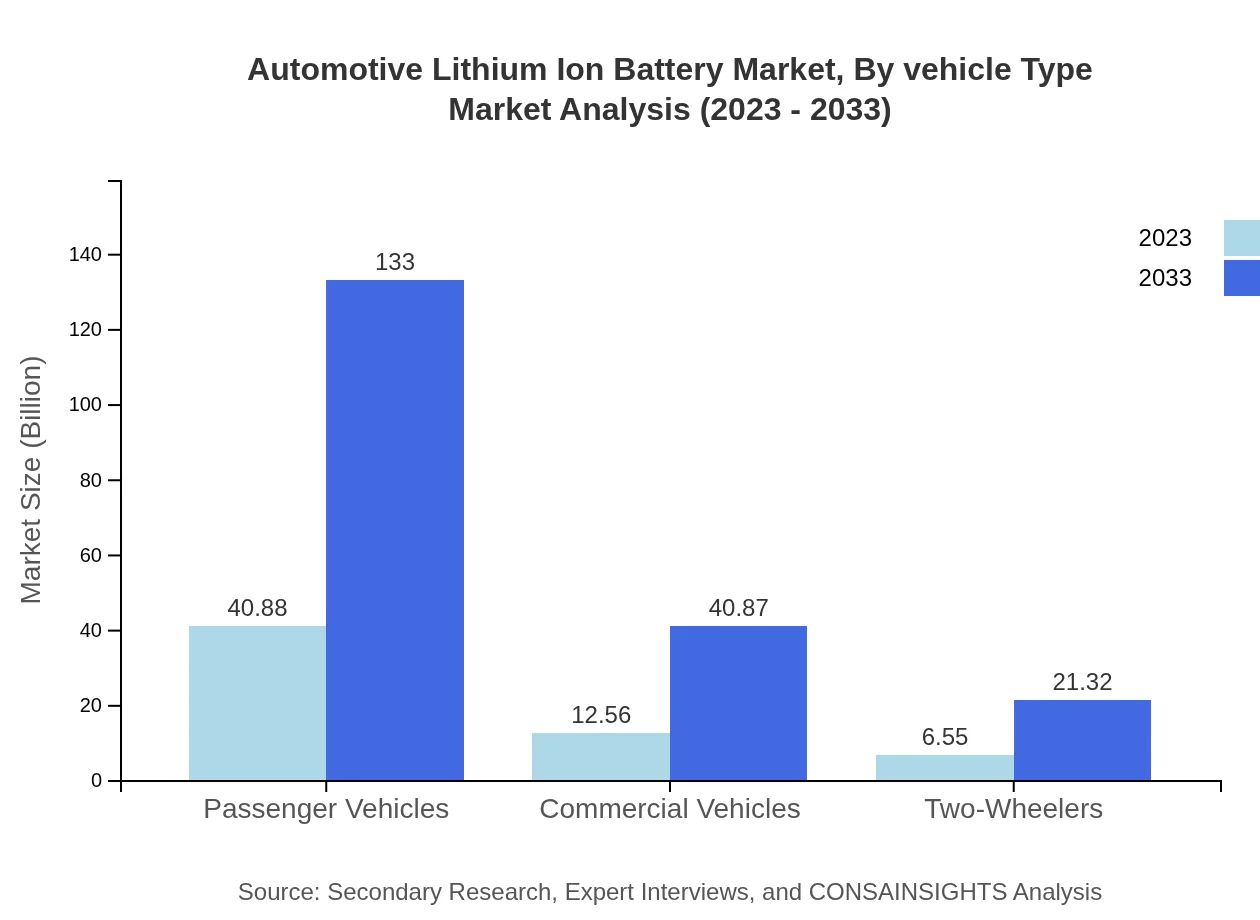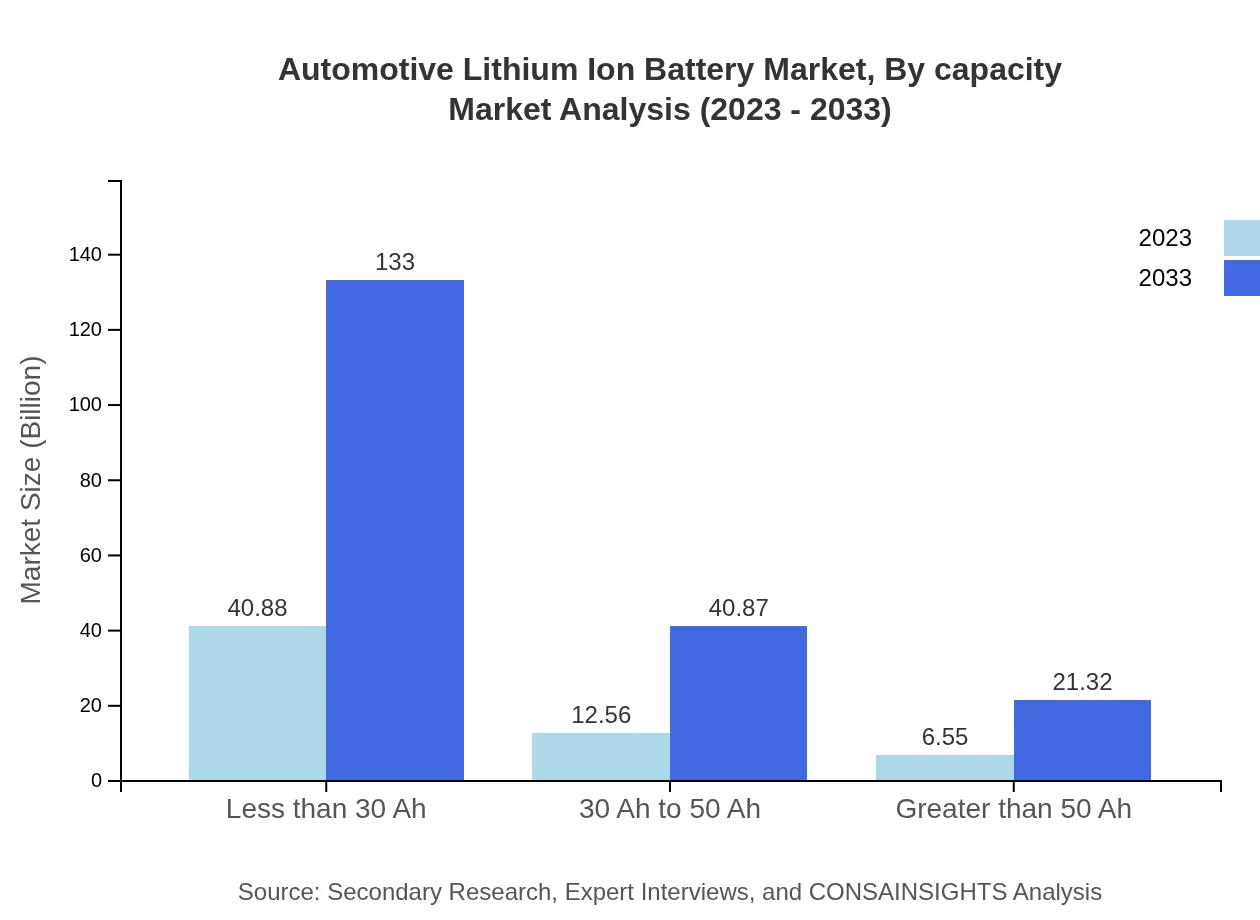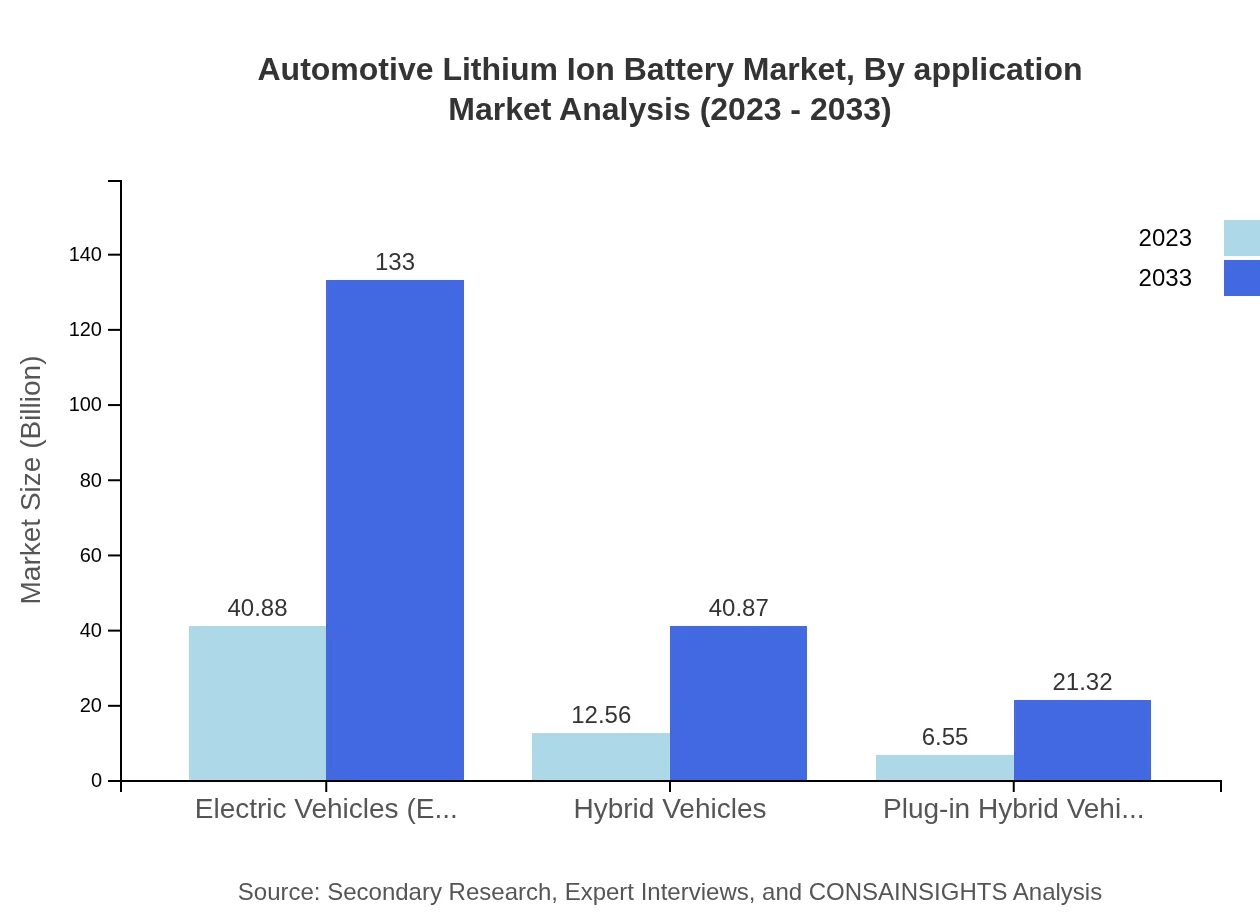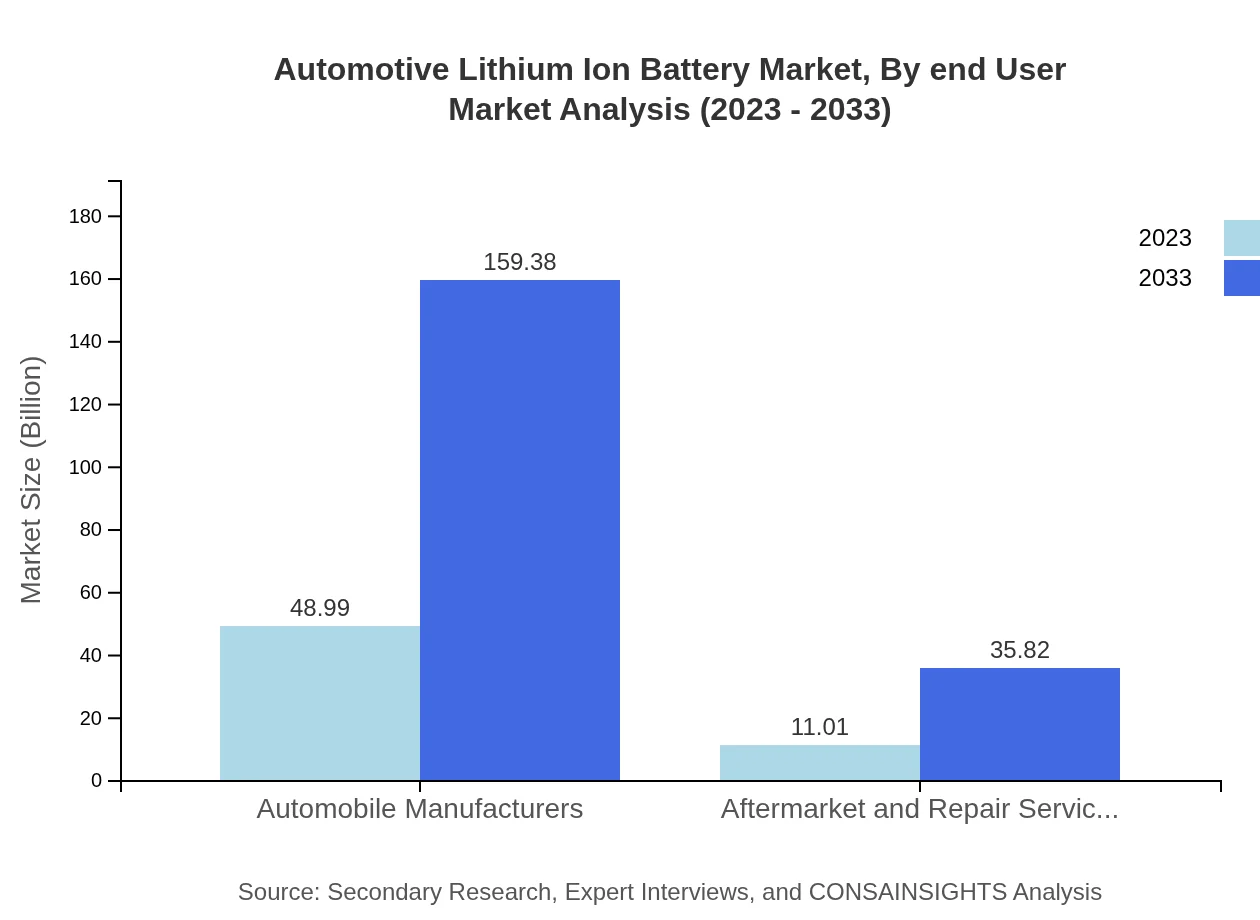Automotive Lithium Ion Battery Market Report
Published Date: 02 February 2026 | Report Code: automotive-lithium-ion-battery
Automotive Lithium Ion Battery Market Size, Share, Industry Trends and Forecast to 2033
This report explores the Automotive Lithium Ion Battery market from 2023 to 2033, highlighting market dynamics, regional analysis, segment insights, and competitive landscape. It provides forecasts, trends, and strategic recommendations based on comprehensive data and industry insights.
| Metric | Value |
|---|---|
| Study Period | 2023 - 2033 |
| 2023 Market Size | $60.00 Billion |
| CAGR (2023-2033) | 12% |
| 2033 Market Size | $195.19 Billion |
| Top Companies | Panasonic Corporation, LG Chem, CATL (Contemporary Amperex Technology Co. Limited), Samsung SDI, BYD Company Ltd. |
| Last Modified Date | 02 February 2026 |
Automotive Lithium Ion Battery Market Overview
Customize Automotive Lithium Ion Battery Market Report market research report
- ✔ Get in-depth analysis of Automotive Lithium Ion Battery market size, growth, and forecasts.
- ✔ Understand Automotive Lithium Ion Battery's regional dynamics and industry-specific trends.
- ✔ Identify potential applications, end-user demand, and growth segments in Automotive Lithium Ion Battery
What is the Market Size & CAGR of Automotive Lithium Ion Battery market in 2023?
Automotive Lithium Ion Battery Industry Analysis
Automotive Lithium Ion Battery Market Segmentation and Scope
Tell us your focus area and get a customized research report.
Automotive Lithium Ion Battery Market Analysis Report by Region
Europe Automotive Lithium Ion Battery Market Report:
Europe is set to see an increase in its automotive lithium-ion battery market size from USD 19.94 billion in 2023 to USD 64.88 billion by 2033. The European market is primarily driven by stringent emissions regulations and a fast-growing EV market, with government incentives to reduce carbon footprints and improve sustainability practices.Asia Pacific Automotive Lithium Ion Battery Market Report:
In Asia-Pacific, the market for Automotive Lithium Ion Batteries is projected to grow from USD 11.30 billion in 2023 to about USD 36.77 billion by 2033. This growth is largely driven by the high demand for electric vehicles in nations like China, Japan, and South Korea. With numerous technology players and established automotive manufacturers in this region, there is a concerted effort to innovate and reduce dependency on fossil fuels.North America Automotive Lithium Ion Battery Market Report:
In North America, the Automotive Lithium Ion Battery market is anticipated to witness substantial growth, rising from USD 19.80 billion in 2023 to USD 64.41 billion by 2033. The region benefits from robust technological innovation and significant government support for electric mobility, with major automakers ramping up EV production.South America Automotive Lithium Ion Battery Market Report:
The South American automotive lithium-ion battery market is expected to expand from USD 2.72 billion in 2023 to USD 8.84 billion by 2033. Factors contributing to this growth include increasing investments in EV infrastructure and the adoption of government initiatives supporting sustainable transportation solutions in countries like Brazil and Argentina.Middle East & Africa Automotive Lithium Ion Battery Market Report:
The Middle East and Africa market for Automotive Lithium Ion Batteries is projected to grow from USD 6.23 billion in 2023 to USD 20.28 billion by 2033. Increasing urbanization and investment in renewable energy infrastructure could significantly enhance EV adoption rates, thus expanding the market for automotive batteries significantly.Tell us your focus area and get a customized research report.
Automotive Lithium Ion Battery Market Analysis By Chemistry
The Automotive Lithium-Ion Battery market by chemistry reveals that Lithium Nickel Cobalt Aluminum Oxide (NCA) dominates the market with a size of USD 32.60 billion in 2023, expected to grow to USD 106.05 billion by 2033. Lithium Manganese Oxide (LMO) and Lithium Nickel Cobalt Manganese Oxide (NCM) follow with market sizes of USD 12.92 billion and USD 8.06 billion in 2023, growing to USD 42.04 billion and USD 26.23 billion, respectively. Lithium Iron Phosphate (LFP) sets a strong presence with an increase from USD 6.41 billion to USD 20.87 billion, showcasing the diversity in battery chemistries and their application-specific advantages.
Automotive Lithium Ion Battery Market Analysis By Vehicle Type
In the Automotive Lithium-Ion Battery market by vehicle type, electric vehicles (EVs) hold a significant market share with a size of USD 40.88 billion in 2023, anticipated to reach USD 133.00 billion by 2033. Hybrid vehicles also contribute substantially, with market growth from USD 12.56 billion to USD 40.87 billion, while plug-in hybrids grow significantly from USD 6.55 billion to USD 21.32 billion, reflecting increasing consumer preference for electrified transportation solutions.
Automotive Lithium Ion Battery Market Analysis By Capacity
Regarding capacity, the Automotive Lithium-Ion Battery market shows diverse performance metrics, with less than 30 Ah segment starting at USD 40.88 billion in 2023 and projected to surge to USD 133.00 billion by 2033. Batteries between 30 Ah to 50 Ah are also set to increase from USD 12.56 billion to USD 40.87 billion, while batteries greater than 50 Ah will rise from USD 6.55 billion to USD 21.32 billion, indicating growing demand across all capacity ranges.
Automotive Lithium Ion Battery Market Analysis By Application
The Automotive Lithium-Ion Battery market, categorized by application, primarily focuses on two key areas: passenger vehicles and commercial vehicles. Passenger vehicles dominate the market with USD 40.88 billion in 2023 and expected growth to USD 133 billion by 2033. Commercial vehicles also reflect growth, advancing from USD 12.56 billion to USD 40.87 billion. The growth in the two-wheeler segment from USD 6.55 billion to USD 21.32 billion demonstrates burgeoning interest in electrifying diverse modes of transportation.
Automotive Lithium Ion Battery Market Analysis By End User
The automotive lithium-ion battery market by end-user showcases significant engagement from automobile manufacturers, with a staggering size of USD 48.99 billion in 2023 projected to soar to USD 159.38 billion by 2033. The aftermarket and repair services segment maintains relevant participation in the market, growing from USD 11.01 billion to USD 35.82 billion over the same period, reflecting sustained interest in maintaining and enhancing existing vehicle fleets.
Automotive Lithium Ion Battery Market Trends and Future Forecast
Tell us your focus area and get a customized research report.
Global Market Leaders and Top Companies in Automotive Lithium Ion Battery Industry
Panasonic Corporation:
A leading manufacturer of lithium-ion batteries renowned for its partnership with Tesla, Panasonic constantly innovates to enhance energy density and improve battery longevity.LG Chem:
A major player in the automotive battery market, LG Chem invests heavily in R&D to develop high-capacity battery technologies, primarily for electric and hybrid vehicles.CATL (Contemporary Amperex Technology Co. Limited):
CATL is one of the world’s largest producers of lithium-ion batteries and is focusing on sustainability strategies while implementing advanced battery technology across electric vehicles.Samsung SDI:
A prominent company that manufactures lithium-ion batteries for vehicles, particularly known for its cutting-edge battery technology and strong market presence.BYD Company Ltd.:
A Chinese automotive manufacturer that also excels in battery production, BYD is at the forefront of electric vehicle and storage solutions development.We're grateful to work with incredible clients.









FAQs
What is the market size of automotive lithium Ion battery?
The automotive lithium-ion battery market is valued at approximately \$60 billion as of 2023, with a projected compound annual growth rate (CAGR) of 12%, signaling robust growth in the coming decade.
What are the key market players or companies in this automotive lithium Ion battery industry?
Key players in the automotive lithium-ion battery industry include prominent companies like Tesla, LG Chem, Panasonic, CATL, and Samsung SDI, which are crucial for innovation and supply chain dominance.
What are the primary factors driving the growth in the automotive lithium Ion battery industry?
The growth in the automotive lithium-ion battery sector is driven by increased demand for electric vehicles (EVs), technological advancements in battery chemistry, and government incentives promoting clean energy transportation solutions.
Which region is the fastest Growing in the automotive lithium Ion battery?
Asia-Pacific is the fastest-growing region in the automotive lithium-ion battery market, projected to rise from \$11.30 billion in 2023 to \$36.77 billion by 2033, reflecting a strong shift towards electrification.
Does ConsaInsights provide customized market report data for the automotive lithium Ion battery industry?
Yes, ConsaInsights offers customized market report data tailored to specific queries and industry needs, ensuring businesses receive insights aligned with their strategic goals in the automotive lithium-ion battery sector.
What deliverables can I expect from this automotive lithium Ion battery market research project?
Expect comprehensive deliverables including market analysis reports, trend forecasts, competitive landscape assessments, and customized insights to support decision-making within the automotive lithium-ion battery industry.
What are the market trends of automotive lithium Ion battery?
Current trends in the automotive lithium-ion battery market include increasing battery capacity, adoption of solid-state technologies, competitive pricing strategies, and sustainability initiatives focusing on recycling and resource management.

